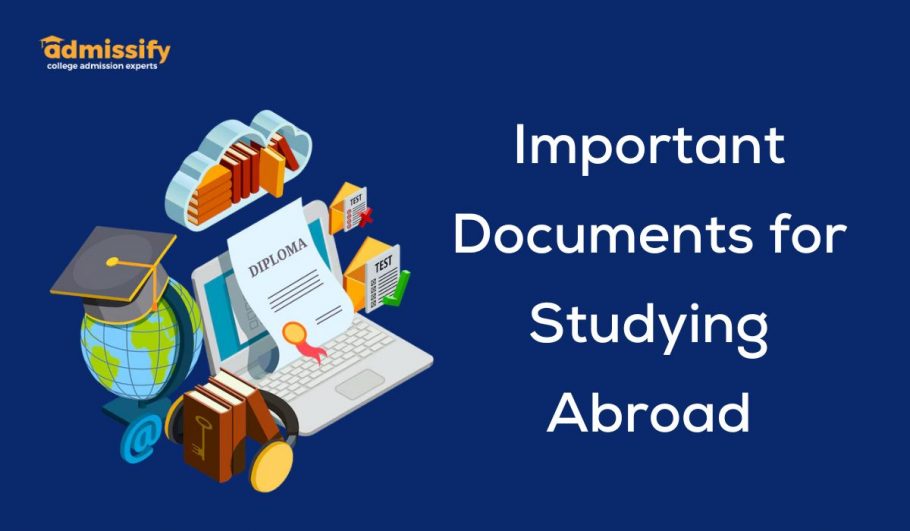Last Updated on August 29, 2024
The scene of international higher education is in a lively mood. For instance, more than a million Indian students set out for abroad courses when the first quarter of 2023 started. Indeed, on the one hand, taking on the difficult road of applying to foreign universities means, among different things, pinpointing correct course and institution selections, as well as handling the daunting task of arranging admission documents, visa papers, accommodation, and more. However, this guide is your total guide of nearly the most important documents that every student wishing to study abroad should know.
Important Documents Needed for Studying Abroad
1. Application Form
The application form is the first and the central part of the application, so attentively filling out the application form is a prerequisite for successful entrance into any school. From being a place where the students can lay out their background, this component requires a thorough assessment to eliminate any errors. It is worth taking time to do a thorough review before submission to detect any flaws before they are recognized by the committee.
2. Statement of Purpose (SOP)
A Statement of Purpose or an SOP is your way of showcasing your ambitions and why you are a good choice for the program you are applying to. An SOP would be a short description of your application. This compelling exposition lays down the foundation of your academic experience chronologically and explains how you concluded a particular university besides providing a brief outline of your plans. Writing a winning admissions SOP corresponds mainly with self-evaluation, in which you must concisely put forward your reasons for pursuing graduate studies, your career goals, and your understanding of the university policy.
3. Academic Transcripts
In terms of academic achievement, transcripts are the principal asset, in which the nexus of all your scholastic activities is summed up. Much in the same way that mark sheets that are known to be common in Indian academia have the same purpose, academic transcripts build up a detailed description of the courses that have been taken, grades that have been achieved, amount of credits, and the degrees that have been attained. Establishing the authenticity of these transcripts is an essential part of the process, and usually, it does require third-party certification, i.e. due approval from the relevant authority. Besides that, many colleges and institutions could charge you for the transcript requests, and thus you should have all the right financial planning and expect from 7 to 174 business days for the processing.
4. Letter of Recommendation (LOR)
A Letter of recommendation can change your whole future; it can become a reference to your abilities, accomplishments, experiences, and contributions. By interest in education or career stages, the support of professors or managers may considerably influence your chance of being recruited. Universities, especially those abroad, often mandate the submission of LORs, categorizing them into two primary types: Academic writing and professional. Academic LOR frequently comes from teachers or other academic officials, Professional LOR in turn is usually provided by the previous employers and they view the person from a different angle comparing their capabilities.
5. Curriculum Vitae (CV) or Resume
Besides writing application documents, a CV or resume (two documents that inform also on educational as well as professional undertakings) becomes a detailed summary of the same. Skillfully crafting will ensure a balance between completeness and compactness in mentioning qualifications and certifications, internships, and work experience relevant to the vacancy.
All in all, your CV should cover the following:
- Contact information
- Academic history
- Professional experience
- Qualifications and skills
- Awards and honours
- Publications
- Professional associations
- Grants and fellowships
- Licenses and certificates
- Volunteer work
- Personal information (optional)
- Hobbies and interests (optional)
6. Test Scores
When considering applying to your preferred university or college, one crucial aspect to bear in mind is your test scores. These scores play a pivotal role in determining your acceptance, underlining the necessity of including them with your application. Duolingo, IELTS, TOEFL, and PTE are some popular English proficiency test scores. Subsequently, your choice of school and the area you are planning on applying from will most probably determine if you will be required to take some extra standardized tests, for example, SAT and GRE, to succeed in the application process.
7. Essays:
The evaluating grades by the test aren’t the only factor that matters in the application process. Rather, the essay also does. Some universities may ask for an essay to demonstrate your determination and your willingness to have your academic coursework overseas. Writing a persuasive essay is quite a promising step, to begin with, that also helps to convince the representatives of the educational institution that they are right to be enrolled in a particular course.
8. A Valid Passport:
Last in the series of stuff must however be the availability of an authentic passport. It is essential to check that you have a valid passport for the period within six months after your date of intended return. Without an international passport or its expiration date due shortly, taking immediate action is a priority either through filling out a new one or renewing the existing document. It is worth stating that this administrative detail should be executed at least three months in advance to guarantee a flawless roll-out into your next academic endeavours abroad.
Conclusion
You can expedite the application process and improve your chances of getting into your desired school by preparing all of these documents ahead of time. Thus, arrange and prepare these documents if you intend to apply shortly. Finally, prepare for an incredible trip by packing your baggage!
FAQs
What are the exact documents you need if you want to study abroad?
The basic documents for the applicants comprise academic transcripts, application forms, curriculum vitae or resumes, letters of recommendation, statement of purpose, English language proficiency test scores, other required scores from SAT and GRE tests, and essays.
How does the application form play a vital role in the process of the study abroad?
The application form is valuable since it acts as an initial impression and text basis for your application. It determines the students to offer their family history, academic record, and other useful details which are critical in the admission process.
What key points should my statement of purpose (SOP) incorporate?
A purpose statement should be brief, thus covering your academic pathway, career goals, reasons why you have chosen this university or a particular program, as well as your contribution to your learning environment. It is an opportunity to demonstrate your ambition and why you should be picked among all the other applicants.
How influential is the academic essay during the application process?
Academic transcripts serve primarily to document academic experiences through a record of all courses taken, grades attained, credits earned, and degrees completed. The reports of your academic achievements must be certified.
Why should a letter of recommendation (LOR) be written and by whom should this letter be given?
A letter of recommendation written in favour of your skills, achievements, experiences, and contributions serves as your reference. Indeed, it may affect whether or not you get in. LORs can be academic and provided by teachers or academic institutions, or they can be professional and issued by your previous employers who can touch upon other facets of your competencies.
What is the difference between a curriculum vitae (CV) and a resume?
CV attempts to capture the essence of the educational and professional life of an individual, by reflecting on the academic background, as well as the work experience, qualifications, certifications, publications, and a lot of other information. On the other hand, a CV goes into detail concerning the skills, achievements, and employment experience that match a particular job position.
How significant are essays in the study abroad application process?
Essays allow for indication of students’ perseverance, desire to master foreign coursework, and the possibility to make a certain program their second home. Just like a persuasive sample essay in the application will bolster the chances of enrollment and convince admission committees of the applicant’s abilities.
How important is my passport while studying abroad?
Remember, studying abroad in time requires a valid passport. A requirement should be made that a passport is valid not later than 6 months after the contemplated return date. Right after that, a passport should be renewed if it is expired or just be obtained if the document is missing.
How far ahead should I work to have my application records sorted for studying abroad?
It is advised to do the task of completing an application package timely, which means at least 8-9 months before the application deadlines. That makes the whole stage smooth and well-planned as it is enough to get all necessary permissions and resolve all the issues the process might be facing.

Kanishka Garg specializes in crafting informative content on study abroad education. Her passion lies in simplifying the journey for students through SEO-optimized articles and blogs. Kanishka’s commitment to clear communication and her deep understanding of international admissions processes make her blogs essential for students aiming to gain insights into top universities worldwide. With Kanishka’s blogs, students can confidently get solutions to the complexities of applying to their dream universities and achieve their academic aspirations abroad.




